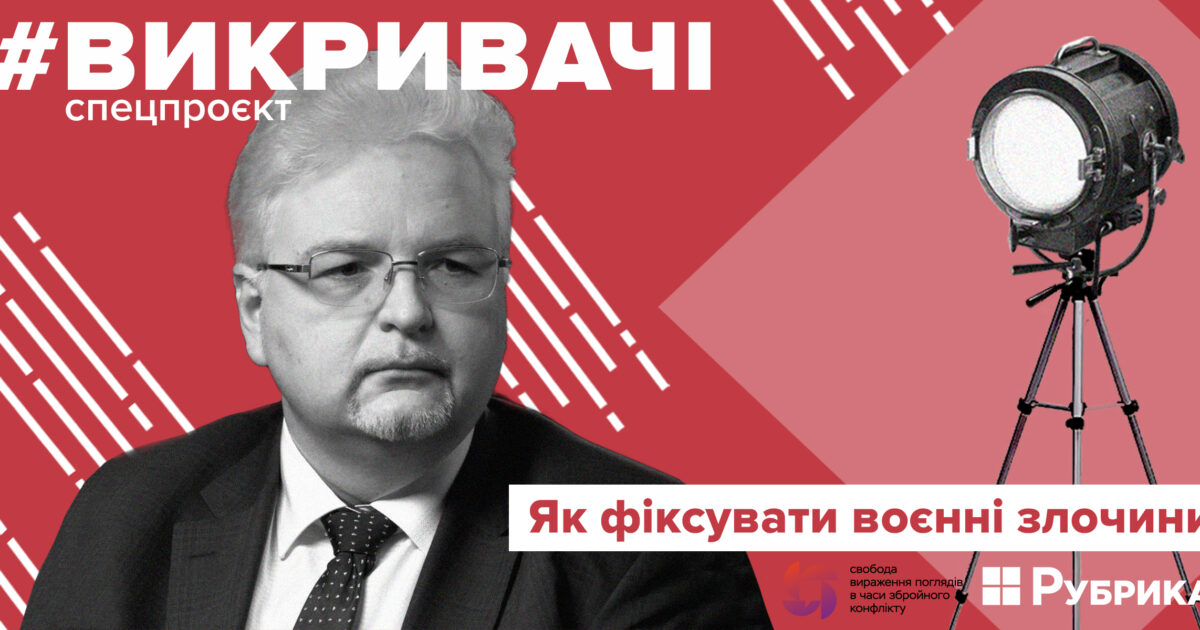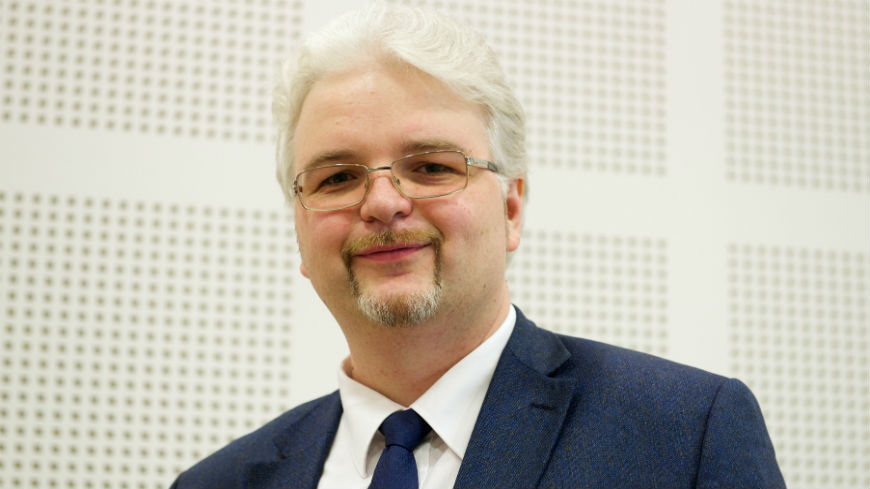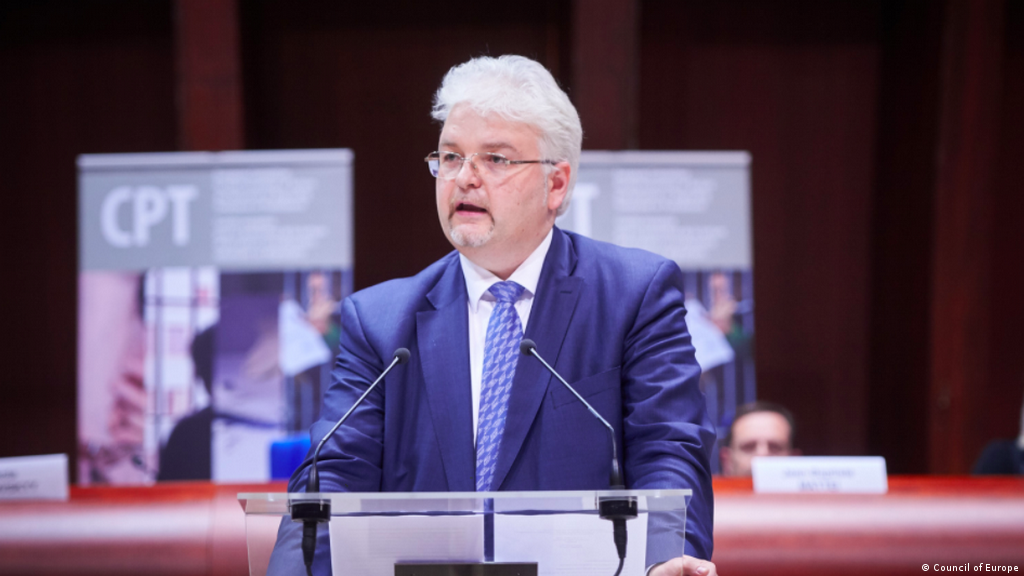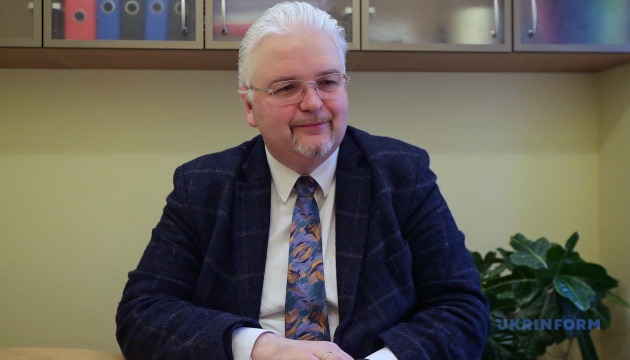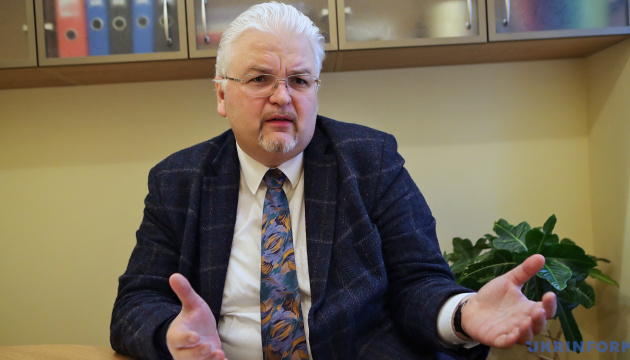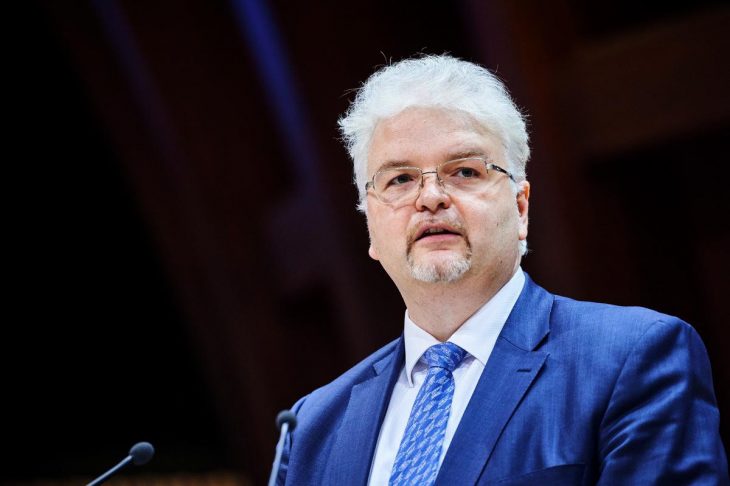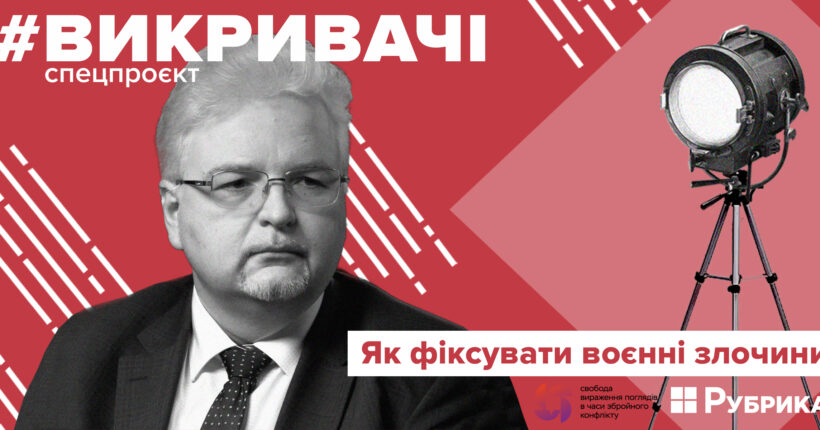
russia's full-scale war in Ukraine has altered the Whistleblowers special project. Nowadays, more than ever, it is important to show different ways out of difficult situations through solutions journalism. We will now talk to scholars, human rights activists, journalists, and civil society activists about how to record war crimes, crimes against humanity, environmental crimes, and human rights violations so that the evidence gathered can be presented to the ICC in The Hague and the perpetrators punished.
Mykola Hnatovskyi talks about war crimes, genocide, and gathering evidence for the International Criminal Court in The Hague.
About war crimes and responsibility for their commission
– What are war crimes? What is the responsibility for their commission?
– War crimes are the most serious violations of international humanitarian law. That is the law that applies during armed conflict and regulates the protection of its victims, as well as the means and methods of armed conflict. Not all violations of these norms are war crimes, but the most serious ones can be considered war crimes. These include attacks on civilian objects, hostage-taking, rape, other sexual crimes, torture of civilians, and so on. The punishment for such crimes is the same as for the most serious crimes in the criminal law of the state. We are talking about long terms of imprisonment or life imprisonment.
– Why is the terminology and correct classification of these crimes important for Ukraine?
– Firstly, it is very important to distinguish warfare crimes from military crimes. Military crimes are those committed by servicemen against the order of their service, and warfare crimes are violations of the laws and customs of war.
First, it is important to properly qualify them, because these are some of the most horrible and serious crimes that can happen. Accordingly, their correct qualifications will also determine the possibility of persecution of those who committed them, their commanders, and the military hierarchy in general, if it is known that they knew that their subordinates were committing such crimes and did nothing to prevent or stop them. Or to investigate these crimes and punish those who committed them.
That is, if we consider these crimes as isolated murders, then we will not see connections throughout the hierarchy, we will not be able to bring to justice all those who in one way or another joined this. This is probably the most important thing. In addition, this is important because Ukraine has an obligation under the Geneva Conventions on International Humanitarian Law to prosecute such violations as war crimes. Ukraine also has commitments in its cooperation with the International Criminal Court, as it has agreed to the ICC's jurisdiction. Accordingly, the investigation of these crimes in the ICC continues as war crimes, crimes against humanity. That is, we must show that we are doing this work at the national level, and the International Criminal Court only helps us, as defined by its Statute. In general, there are many identified legal reasons why it is important to correctly classify war crimes.
When does genocide begin and how to prove it in the ICC?
– Recently, several countries around the world have already recognized that what is happening in Ukraine now is genocide of the Ukrainian people. When does genocide begin and how can it be proved in the International Criminal Court?
– Genocide, like war crimes, is one of the so-called crimes involving atrocities and mass violence. There are three categories of closely related, affiliated crimes: war crimes, crimes against humanity, and genocide.
Genocide differs in that it is carried out with the specific intention of destroying a particular national, ethnic, racial, or religious group in whole or in part. In this case, the actions of russia and the people under its control, together with statements made by the russian leadership and the controlled propagandists, show that the purpose of this violence, these crimes may be to destroy Ukrainians as a national group. That is the destruction of Ukrainians as a political nation. And in this sense, unfortunately, there are grounds to say that atrocities of this scale, combined with plans like to "de-Ukrainianize Ukraine," or "solve the Ukrainian issue" are genocide. Although judicial proof, in contrast to political statements, is very difficult and there are not many cases where the international court has been able to prove that genocide took place.
For example, this was the case with the Holocaust. But at the same time, this issue was considered by national courts, not international ones. This happened in the episode concerning Srebrenica, where the male population aged 16 to 60 was exterminated. At the time, both the International Criminal Tribunal for the Former Yugoslavia and the International Court of Justice described it as genocide. But these are isolated examples. Because, for example, when the representatives of Croatia tried to prove in the UN International Court of Justice that Serbs had committed genocide in Vukovar, they did not succeed. Even though the relevant political assessments resonated.
Therefore, I would distinguish between political qualifications and what will be proven directly in court. The fact is that the mass violence, the horrific atrocities that have already been uncovered in Ukraine, together with the ideology that supports it with their statements, at least activate the obligations of all countries to prevent genocide. In other words, this is another good reason to help Ukraine repel russian aggression and win this armed conflict. Because otherwise, unfortunately, the risk of full-scale genocide, not with thousands, tens of thousands, but with millions of victims, is quite realistic. Therefore, it is necessary to act now.
– What can Ukraine do to prove to the ICC that this is genocide? What lessons should we learn from the experience of other countries?
– The point is not even in mistakes, the fact is that genocide requires proof of special intent to commit genocide, i.e. to destroy the group as such. That is, in this case, it is necessary to prove that not only civilians are being destroyed, there are not just atrocities, but there is a plan to exterminate Ukrainians as Ukrainians, as a national group. The ICC is about the criminal responsibility of individuals, not russia as a state. The standard of proof in criminal cases is very high, it is necessary to prove the guilt of a person "beyond a reasonable doubt."
We have obvious war crimes, there are obvious crimes against humanity. It is even a bad tone to say that, say, the crime of genocide is more important than crimes against humanity. Absolutely not. Thousands and millions of innocent people are dying in both situations. But, I emphasize, that there are grounds to say that all states must fulfill their duty, their international legal obligation to prevent full-scale genocide in Ukraine, and this must be done now. And in this sense, the statements of the United States and Canada, other countries that support Ukraine in this, are relevant.
– On March 7th, the first session of the International Criminal Court to investigate the war crimes of the russian army began in The Hague. Is the international community ready to give a legal assessment of russia's war crimes?
– It is ready. The international legal community is ready. 42 states that have ratified the Rome Statute have appealed to the Prosecutor of the International Criminal Court to investigate war crimes against humanity in Ukraine. By the way, the prosecutor said that he also has jurisdiction to investigate the crime of genocide. If the prosecutor sees such signs of a crime, he will investigate the crime of genocide, whether someone wants it or not. This will be his decision and only the judges of the ICC have control over his decisions, not the state. So there is an absolute readiness, the whole world is shocked and staggered by the terrible crimes that are now being committed, in fact, in the heart of Europe, and in this sense, there are no serious political obstacles. Justice can be done, but Ukraine must not rely solely on the work of the International Criminal Court, but must, at its national level, certainly with the help of international partners, investigate these crimes and leave the work to international courts only where Ukraine has no effective opportunities to do so.
– How are cases initiated in the International Criminal Court?
– There are three ways to initiate proceedings in the International Criminal Court. One of them is when the states that have ratified the Rome Statute, one or more (in our case 42), transfer the situation to the ICC prosecutor for investigation and he immediately begins the investigation.
The second case is when the prosecutor independently studies the situation on his own and then decides whether or not to initiate an investigation by his own initiative. This is what happened until recently, before the beginning of March concerning Ukraine. Because Ukraine agreed to jurisdiction, but because it did not ratify the Rome Statute, it could not refer the situation to investigation and therefore patiently waited 7.5 years for the prosecutor to say that he would still investigate, but even he had to get sanction of the Chamber of Preliminary Proceedings of the International Criminal Court.
The third way to initiate an investigation is to refer the situation to the International Criminal Court by the UN Security Council.
So, when I said that these states appealed, it does not mean that they qualified something, they exercised their right to initiate such investigations.
– And why has Ukraine not yet ratified the Rome Statute? What were the obstacles along the way?
– There is no rational argument for Ukraine not to ratify the Rome Statute. At stake are the ignorance of certain lawyers and the mythology they feed some of our politicians, who draw the wrong conclusions from their false advice. Refusal to ratify the Rome Statute is unacceptable, it severely damages Ukraine's image and severely undermines the world's belief that Ukraine sincerely wants to investigate the crimes.
– What are Ukraine's expectations from the International Criminal Court in The Hague?
– The fact is that no matter how well we organize the investigation, it has its limits at the national level. Some people enjoy immunity under international law from national investigations: foreign heads of state, government, and foreign ministries. That is, the state cannot file a claim against them in its own court, unfortunately. Some people will successfully hide from the Ukrainian judiciary simply because they are abroad and may not be extradited to us. That is why the work of the International Criminal Court is very important to us. But it is impossible to have high expectations from the ICC, because more than 90% of criminal offenses Ukraine must investigate and bring to appropriate sentences at the level of national courts independently. Or with the help of international partners. But this assistance is more technical because the decision must be made by Ukraine and Ukrainian courts and prosecutors.
How to gather evidence and not interfere?
– You are one of the initiators of creating a special tribunal to bring russia to justice. What does it foresee?
– This initiative aims to create a special tribunal for the crime of aggression against Ukraine. The tribunal is criminal, so it is a criminal responsibility of specific persons, those who are responsible for decision-making in the russian federation, who decided to carry out this aggressive war, which began in 2014.
The idea is that while the ICC and the Ukrainian judiciary can successfully deal with war crimes, crimes against humanity, and the crime of genocide, there is a problem with the crime of aggression. Aggression is the beginning of everything, that is, it is the decisions themselves and their implementation. Therefore, aggression, as the Nuremberg tribunal once said, contains the accumulated evil of all other crimes. But the ICC in the case of the russian federation has no jurisdiction, i.e. it cannot investigate the crime of aggression committed by russian officials (russia has not ratified the ICC Charter and its amendments) and is unable to prosecute the russian leadership for aggression. russia will also block the UN Security Council from any attempt to classify its actions as an act of aggression and to call on the ICC to bring to justice those who led it.
Ukraine can investigate this at the national level, but the immunities of russia's top leadership, namely those who decided to attack Ukraine, legally impede the Ukrainian court. Therefore, the idea is to use the experience of the Nuremberg tribunal and quickly create an international judicial body that would deal with the crime of aggression. It will complement the International Criminal Court.
– What exactly can each person do to properly record these crimes?
– The Prosecutor General's Office has created a website warcrimes.gov.ua, where people can report that they have witnessed a crime or are victims. To directly record crimes and carry out criminal activities, it is necessary to have the appropriate training and procedural status. This should be done firstly of all by forensic experts, ballistics experts, forensic experts, etc. Conduct an examination of the bodies of the dead, record the injuries of the survivors, ballistic examinations, interview witnesses, establish all the circumstances, make quality photography and video. After all, then all this evidence will have to be presented in court. But people can help by pointing out the information they have.
As for private initiatives to document crimes, I am not a big supporter of them. Of course, there are a lot of crimes and the Office of the Prosecutor General should be helped, but this work should be done by professionals because incorrectly collected evidence will not stand up in court. Then there can be problems when, for example, a crime is committed when there is a victim when everyone demands justice, and it is impossible to bring to justice because some material has been illiterately collected.
– How does the collection of evidence work in the International Criminal Court in The Hague?
– They receive information from everyone, so to speak, willing, who has it and who writes to them. These are primarily non-governmental organizations. They play a huge role here. But the ICC must also obtain evidence that is more valuable in court, and therefore they will obtain this evidence from cooperation with law enforcement agencies, especially with the prosecutor's office. This procedure is provided for in Part 9 of the Rome Statute, and Ukraine, as far as I understand, must soon adopt amendments to the Code of Criminal Procedure that will allow our prosecutor's office to better cooperate with the ICC and its Prosecutor's Office.
– How long do we have to wait for the crimes to be proven and the perpetrators to be held accountable?
– Proving the crime of aggression within a special tribunal, if it is created, and forming an indictment is a matter of several months. In the case of war crimes, crimes against humanity, and the crime of genocide, it is much longer. In international courts, this takes many years. Experience has shown that some people, unfortunately, will not even be able to wait for justice to come. At the national level, this can be done faster, but it also requires proving a huge number of circumstances. Therefore, you need to be patient.
– Do you think it will be possible to prove these crimes so that the guilty are punished? If criminals are hiding abroad or in the same russia and it will not release them, how to satisfy society's desire for justice?
– I am convinced that sooner or later everything will be investigated and the perpetrators will be identified and punished. But it takes time. Fortunately, all the crimes we are talking about do not have a statute of limitations. We know how long it took to catch all the Nazi war criminals, some of whom were found in the 21st century. Let's hope that everything will be much faster now. But the process is long. This is a struggle that the relevant lawyers will pursue all their careers, all their lives, and pass on to their successors.
Newsletter
Digest of the most interesting news: just about the main thing




